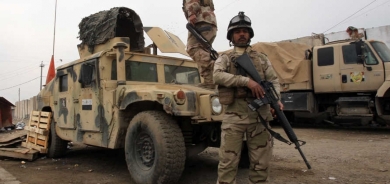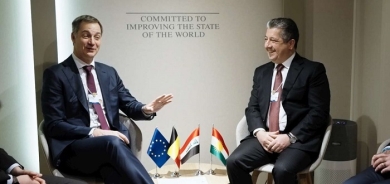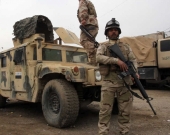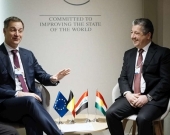In Break With Past, Germany Agrees To Arm Iraq's Kurds

Islamic State, which posted a video on Tuesday purporting to show the beheading of an captive American journalist , poses a threat to the world and Europe cannot simply stand by, Germany's defense and foreign ministers said.
Besides humanitarian aid and military equipment such as body armor and helmets, "we can also imagine providing further equipment, including weapons," Foreign Minister Frank-Walter Steinmeier said.
"In close agreement with our European and international partners we will do this in such a way that it boosts the peshmerga's [semi-autonomous Kurdish security forces] ability to defend themselves," Steinmeier said. "We see the risks attached to this, and we will therefore show a sense of proportion in the nature of what and how much we deliver."
Sending arms into conflict zones is a major departure for Germany, which has often shied away from direct involvement in military conflicts since World War Two due to its Nazi past. Berlin opposed the U.S.-led 2003 Iraq war although it took part in the international military mission in Afghanistan.
Germany - the world's third largest arms exporter after the United States and Russia - had previously promised to cut back on arms deliveries to non-allied states particularly to the Gulf. Deliveries to direct conflict zones was always ruled out.
Asked why Germany would make an exception for northern Iraq, German government spokesman Steffen Seibert said: "ISIS' advance and what these terrorists are doing.. has a unique quality. We cannot be indifferent in Europe and Germany - it also affects our security interests... all the dangers arising from there and the huge scale of human suffering informed this decision."
Steinmeier, who visited Iraq last Saturday, had made clear he believes Germany has a moral obligation to provide military support against Islamic State. According to a poll by Forsa published on Wednesday however, 63 percent of Germans are against supplying weapons to the Kurds.
Italian Prime Minister Matteo Renzi paid a one-day visit to Iraq on Wednesday and his government said it was ready to consider requests for supplies of personal weapons and ammunition for self-defense.
Defense Minister Roberta Pinotti said Italy had earmarked light automatic weapons and ammunition used by the Italian armed forces, as well as arms made in the former Soviet Union and seized at sea during the 1990s Balkan wars, to be sent to Iraq.
German Defense Minister Ursula von der Leyen said Berlin would examine over the next week what equipment was available to send and what the Kurdish security forces needed.
Germany does not have Soviet-manufactured weapons, but would look into training Kurdish security forces in further equipment, a defense ministry spokesman said.
Pinotti said Italy was prepared to join other countries in providing transport for weapons supplies and said technical preparations were already under way. The plan could be put into action within days providing it had the support of the Italian parliament and received approval from the Iraqi government and clearance to fly over third countries, she said.
Efforts had to be coordinated to avoid duplication, she added, and there had to be adequate oversight to ensure the weapons went to official government forces and were only used for self-defense.
At the start of 2014 Steinmeier, German President Joachim Gauck and von der Leyen all said Germany had to engage more actively in international security, and that its size meant Germany could not simply watch from the sidelines. (Writing by Alexandra Hudson; Editing by Madeline Chambers and Mark Heinrich)
Reuters














